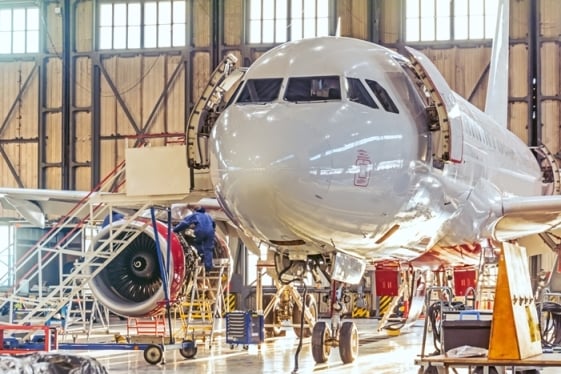The aerospace manufacturing industry is constantly evolving, and 2023 promises to be an interesting year for the sector. 2022 was a year of upwards movement in air travel and the aerospace industry responded with increased production of both narrow-body and wide-body aircraft. However, there are a few key factors that could inhibit aerospace manufacturing in 2022.
As we’ve moved past the pandemic, many of the initial disruptions to the global supply chain have subsided. However, while there is still potential for further disruptions, there is even more space for innovation.
As we enter 2023, RCO Engineering is at the forefront of aerospace manufacturing technology. Our team is dedicated to helping our clients stay ahead of the curve and take advantage of new opportunities as they arise. In this blog post, we'll explore five key predictions for the aerospace manufacturing industry in 2023.
Air Travel Recovery Will Continue To Grow
The aerospace industry is extremely cyclical, and the rebound in air travel that began in 2021 is expected to continue throughout 2023. We can expect to see increased demand for air travel and, in turn, increased demand for aircrafts driving the need for more maintenance and upgrades on aircrafts not to mention more manufacturing of aerospace components. This will create opportunities for aerospace industry manufacturers to grow their aftermarket revenues.
Digital Innovation Will Continue To Play A Key Role In Aerospace Manufacturers’ Growth
The aerospace manufacturing industry is constantly evolving and we can expect to see a continued focus on digital innovation in 2023. This includes the use of data analytics, internet of things (IoT), and artificial intelligence (AI) to improve processes such as design, production, and maintenance.
We can also expect growth in the space market. With companies such as SpaceX and Blue Origin making significant advancements in reusable rockets, we will see an increase in demand for spacecraft and payloads. This is good news for the future of the aerospace industry as it opens up new opportunities for growth.
Supply Chain Disruptions May Inhibit Production
Supply chain disruptions may inhibit production as OEMs struggle to meet demand. Airbus has already signaled that it will be shifting supplier orders around to ensure that aircraft production rates remain high, and Boeing is expected to follow a similar pattern. This could lead to shortages of some components and increased costs for the entire supply chain.
Already a common aerospace manufacturing industry trend, supply chain disruptions that are expected to have a significant impact on production rates. These disruptions include supplier shortages, labor unrest, and trade disputes.
Airbus And Boeing Production Rate Trends
Demand from Airbus' narrow-body aircraft suppliers will closely mimic aircraft production rates. This is in contrast to Boeing's supplier demand, which is expected to be substantially lower than production rates for most or all of 2023. This shift is due largely to the fact that Airbus has a backlog of orders that will keep production rates high through the end of 2023.

Increase In Demand For Wide-Body Aircrafts
As air travel rebounds, airlines are increasingly turning to wide-body aircraft for long-haul routes. Demand for these planes is expected to remain high throughout 2023. This will help sustain growth for aerospace industry manufacturers. However, this is not expected to last for long, and by the end of 2023 both Boeing and Airbus are expected to see significant increases in wide-body production rates.
China/US Tensions May Affect Growth
A significant portion of the aerospace manufacturing supply chain is located in China, and recent trade tensions between the US and China have led to supplier disruptions.
Manufacturers can expect these disruptions to have a significant impact on production rates and may cause OEMs to seek alternate suppliers. These disruptions are expected to cause production rates for Airbus and Boeing aircrafts to be inhibited in 2023.
Deployment Of Digital Thread And Smart Factory To Increase Efficiencies
OEMs have been focusing on deploying digital thread and smart factory technologies in order to increase efficiency and accelerate the production process. These initiatives are expected to continue through 2023, with the goal of recovering from any lost time due to supplier disruptions.
Large Twinjet Freighters Top Of Min For Boeing And Airbus
2023 will be the year of the large twinjet freighter. Boeing and Airbus will both focus on this market segment as it continues to grow in popularity. These aircrafts are expected to have a positive impact on the aerospace manufacturing industry as a whole, by driving more orders and higher production rates.
US Air Force To Fund Successor For F-22
The F-22 will soon be replaced by the US Air Force’s Next-Generation Air Dominance fighter. While plans for this fighter are well under wraps, it is known that the successor will be heavily reliant on advanced aerospace manufacturing technology. This will ensure that the USAF remains at the forefront of air combat for years to come. Manufacturers can expect to see increased demand for products and services related to the Next-Generation Air Dominance fighter program.
Looking Forward To The Future Of the Aerospace Industry
As we look towards the future of 2023, it’s clear that the aerospace manufacturing industry is in for some exciting times. Both Airbus and Boeing are expected to see increased demand for their narrow-body aircraft, while wide-body production rates will remain modest. Digital innovation will be a key focus for many manufacturers in order to drive growth in the aftermarket sector. And last but not least, the space market is expected to continue its rapid growth.
RCO Engineering is looking forward to the future of the aerospace manufacturing industry. We are committed to providing our customers with cutting-edge aerospace manufacturing technology and innovative solutions that will help them stay ahead of the competition.
Work with professional manufacturers today! Contact us to get a quote.

Comments